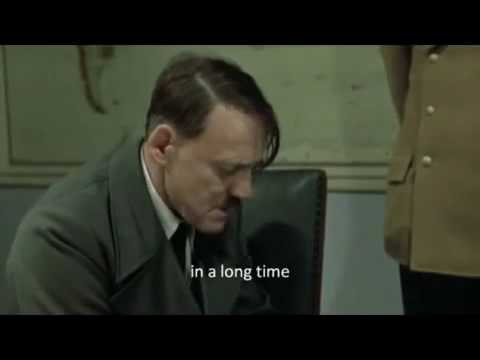The internet is a melting pot of creativity, humor, and shared experiences, giving rise to some of the most interesting and unique cultural phenomena. One such phenomenon is the “Downfall” meme, which took the internet by storm, sparking laughter and debate in equal measure. This essay delves into the origins, elements, popularity, variations, and effects of the viral “Downfall” meme on society and internet culture, shedding light on its significance and impact.
Background on the film “Downfall”
The 2004 German film “Downfall” (Der Untergang) is a historical drama depicting the final days of Adolf Hitler’s rule over Nazi Germany. Directed by Oliver Hirschbiegel, the film is an adaptation of the book “Inside Hitler’s Bunker” by Joachim Fest and the memoirs of Traudl Junge, Hitler’s personal secretary. The film gained critical acclaim for its realistic portrayal of the characters and events leading to the fall of the Third Reich.
One particular scene from “Downfall” stands out and has become the basis of the meme: Hitler’s rant scene. In this scene, Hitler (played by Bruno Ganz) is informed by his generals that the war is lost, and he subsequently launches into a furious tirade. This emotional outburst, combined with Ganz’s exceptional performance, sets the stage for the meme’s inception.
First instances of the meme
The “Downfall” meme began to gain traction in 2006 when internet users started creating parodies of Hitler’s rant scene by adding humorous, satirical, and often unrelated subtitles. The first known instance was uploaded to YouTube in August 2006, featuring a comical take on the release of Microsoft’s Zune media player. This video, along with other early parodies, laid the foundation for the meme’s subsequent rise in popularity.
Elements of the “Downfall” Meme
Video and audio components
The “Downfall” meme primarily consists of two components: the original video clip from the film and the manipulated subtitles. The video clip remains unchanged, using the same scene from the movie in which Hitler furiously reacts to his generals’ dire news. The audio also remains unchanged, preserving Ganz’s powerful performance in the German language.
Themes and topics
The key to the “Downfall” meme’s appeal lies in the humorous and satirical nature of the subtitles. By manipulating the subtitles, creators can make Hitler’s rant seem like a reaction to various unrelated topics and events. This adaptability allows the meme to remain fresh and relevant, as it can be tailored to any subject or current event, ranging from politics and sports to entertainment and personal life experiences.
The Rise in Popularity
Role of social media platforms
The internet and social media platforms played a pivotal role in the rapid spread and popularization of the “Downfall” meme. As more people began creating and sharing their own versions of the meme, it quickly gained traction on platforms like YouTube, Reddit, and Facebook. The shareable nature of these platforms, coupled with the meme’s relatability and humor, contributed to its virality.
Factors contributing to its virality
The “Downfall” meme’s popularity can be attributed to several factors. Firstly, its relatability and universal appeal make it an easy target for humor, as people from all walks of life can find something to laugh about in the various iterations of the meme. Secondly, the humor factor is undeniable, with the juxtaposition of Hitler’s intense performance and the lighthearted, often absurd subtitles providing a source of amusement for viewers. Lastly, the simplicity of creating variations allows for a constant influx of new content, ensuring that the meme remains fresh and engaging.
Popular Variations of the “Downfall” Meme

Sports-related parodies
The sports world has been a fertile ground for “Downfall” meme variations. Fans have used the meme to express their disappointment or joy over their favorite team’s performance, a controversial referee decision, or even the outcome of an entire season. These sports-related parodies often gain traction among fans, who can relate to the emotions expressed in the subtitles and find humor in the absurdity of the situation.
Political and social commentary
The “Downfall” meme has also been employed as a tool for political and social commentary. By replacing the original subtitles with those addressing a political issue, scandal, or election, creators can satirize the subject matter and encourage discussion among viewers. This use of the meme highlights its versatility and adaptability, as it can be tailored to address a wide range of topics and encourage discourse.
Pop culture and entertainment industry
Pop culture and the entertainment industry have not been immune to the “Downfall” meme treatment. Creators have used the meme to address various aspects of the entertainment world, from movie releases and award ceremonies to celebrity scandals and controversies. These variations often attract a large audience, as they tap into the public’s fascination with the entertainment industry while still providing a humorous twist.
Personal and everyday life situations
The “Downfall” meme has also been adapted to address personal and everyday life situations, demonstrating its broad appeal and relatability. From workplace frustrations to relationship woes, the meme has found a way to touch on almost every aspect of human life. This has allowed people to find humor and camaraderie in their shared experiences, further solidifying the meme’s place in internet culture.
Effects on Society and Internet Culture
The influence on meme culture
The “Downfall” meme has undeniably left its mark on internet culture and meme development. Its success has paved the way for other similar memes that capitalize on the juxtaposition of serious or dramatic situations with humorous or absurd subtitles. The meme’s influence has also contributed to shaping internet humor, pushing creators to find new and inventive ways to engage audiences and keep the meme format fresh and interesting.
The impact on historical perception and understanding
The widespread use of the “Downfall” meme has sparked debates around the portrayal of Hitler and the Third Reich in popular culture. Some argue that the meme trivializes a dark period in history, while others contend that it allows for a new way to engage with and understand the past. This discussion highlights the power of internet culture to shape our understanding of historical events and the importance of considering the potential consequences of using these events for entertainment purposes.
The reaction of the film’s creators and actors
The creators and actors of “Downfall” have had mixed reactions to the meme’s popularity. Director Oliver Hirschbiegel has expressed appreciation for the meme, stating that it allows the film to reach a wider audience and encourage discourse about Hitler and the Nazi regime. On the other hand, actor Bruno Ganz has expressed concern over the potential trivialization of the subject matter, while acknowledging the meme’s role in keeping the film relevant. Legal issues and copyright concerns have also arisen due to the meme’s widespread use, prompting discussions around the rights of creators and the implications of using copyrighted material for parody purposes.
Conclusion
The “Downfall” meme is a testament to the power of internet culture to shape our understanding of the world, create connections, and spark debate. Its lasting legacy lies not only in the laughter it has generated but also in the discussions it has inspired about history, art, and the role of the internet in shaping our perceptions. By examining the origins, elements, popularity, and effects of the “Downfall” meme, we gain valuable insight into the complexities of internet culture and its ability to transform and evolve over time. The meme’s adaptability and universality have allowed it to remain relevant and engaging, ensuring its continued presence in the ever-changing landscape of online humor and discourse.
As we continue to explore and analyze the impact of internet culture on society, the “Downfall” meme serves as a fascinating case study. It reminds us of the power of humor and creativity in connecting people from diverse backgrounds, while also highlighting the responsibility we have in engaging with history and the potential consequences of using it for entertainment purposes. In the end, the “Downfall” meme stands as a testament to the power of human ingenuity, the influence of the digital age, and the indelible mark that internet culture leaves on our collective consciousness.
